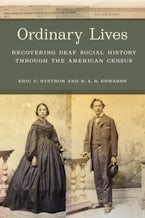
Ordinary Lives
Recovering Deaf Social History through the American Census
Published by: University of Massachusetts Press
272 Pages, 6.00 x 9.00 x 1.00 in, 11 illus., 1 chart, 13 tables
Other Retailers:

by Eric C. Nystrom and R.A.R. Edwards
Published by: University of Massachusetts Press
272 Pages, 6.00 x 9.00 x 1.00 in, 11 illus., 1 chart, 13 tables
Other Retailers:
The collective social history of deaf people in America has yet to be written. While scholars have focused their attention on residential schools for the deaf, leaders in the deaf community, and prominent graduates of these institutions, the lives of “ordinary" deaf individuals have been largely overlooked.
Employing the methods of social history, such as the use of digital history techniques and often-ignored sources like census records, Eric C. Nystrom and R. A. R. Edwards recover the lived experiences of everyday deaf people in late nineteenth century America. Ordinary Lives captures the stories of deaf women and men, both Black and white, describing their family lives, networks of support, educational experiences, and successes and hardships. In this pioneering “deaf social history," Edwards and Nystrom reconstruct the biographies of a wider range of deaf individuals to tell a richer, more nuanced, and more inclusive history of the larger American deaf community.
Introduction
Chapter 1 Chapter 2
Deafness and the Census
Chapter 3
Population
Chapter 4
Lydia Macomber’s Network
Chapter 5
Becoming a National Community
Chapter 6
Race
Chapter 7
Geography
Chapter 8
The Deaf Vineyard in 1880
Chapter 9
Institutions and Work
Chapter 10
Joseph DeHart
Conclusion and Future Directions
Appendix: QueriesERIC C. NYSTROM is associate professor of history at Arizona State University.
R. A. R. EDWARDS is professor of history at Rochester Institute of Technology and author of Words Made Flesh: Nineteenth-Century Deaf Education and the Growth of Deaf Culture.
“Ordinary Lives makes important contributions to deaf history, and it will encourage new areas of research across multiple disciplines.”—Octavian Robinson, associate professor of deaf studies at Gallaudet University
“Nystrom and Edwards are the first scholars to explicitly widen the historiographical practices of deaf history to include social history.”—H-Dirksen L. Bauman, coeditor of Deaf Gain: Raising the Stakes for Human Diversity
This website uses cookies so that we can provide you with the best user experience possible. Cookie information is stored in your browser and performs functions such as recognising you when you return to our website and helping our team to understand which sections of the website you find most interesting and useful.
Strictly Necessary Cookie should be enabled at all times so that we can save your preferences for cookie settings.
If you disable this cookie, we will not be able to save your preferences. This means that every time you visit this website you will need to enable or disable cookies again.
